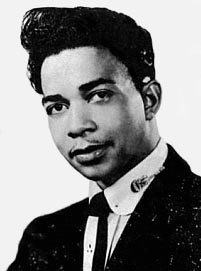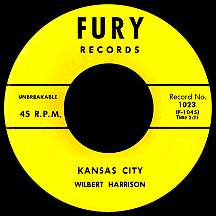WILBERT HARRISON
Kansas City
Crazy little women? That's reason enough for a guy to head to either of the same-named cities on the border of Kansas and Missouri...provided he's bought into what Wilbert Harrison said in his classic rock and roll hit "Kansas City." The song, already seven years old before hitting the mainstream, didn't initially guarantee an overabundance of wild girls in the midwest mini-Metropolis, the lyrics by Mike Stoller and Jerry Leiber even more suggestively claiming residents had '...a crazy way of lovin' there.' Talented Texan singer and pianist Little Willie Littlefield, a former Modern Records artist who'd racked up a few hits (the biggest: "It's Midnight" in 1949), waxed the original version, christened "K.C. Loving," for Federal in 1952. By the time Wilbert took it on, that part of the lyrics had been changed to 'they got some crazy little women there and I'm gonna get me one.' Still more lyrics were modified, though the arrangement remained basically the same other than the original's sax sound being replaced by a piano- and deliberately choppy guitar-based rhythm. Littlefield's record had flopped, but the timing was right for Harrison's interpretation; it was a number one smash in the spring of 1959.
Seven years into his recording career, 30-year-old Wilbert, by that time competently skilled at piano, guitar, harmonica and drums, was ready for success though perhaps not so prepared for a bit of havoc wreaked upon him by his former label, Savoy. The native of Charlotte, North Carolina had sung with a group called The Calypso Four, then recorded "This Woman of Mine" in 1953 for a small Miami label, Rockin', as Wilburt Harrison; the influence of Littlefield's "K.C. Loving" is clear in this first effort, little more than the Leiber-Stoller tune with a different set of lyrics (composing credit omitting Jerry and Mike, instead designating Rockin' owner Henry Stone and Rob Ellis) and the aforementioned arrangement that would be used periodically, right up through "Kansas City" and beyond.
This derivative approach contradicted Harrison's musical and vocal talents somewhat and may have been partly responsible for his slow ascent. Cincinnati's King Records picked up the master to "This Woman," releasing it and another Wilburt disc, "Nobody Knows My Trouble," on its DeLuxe label. Soon after signed by Savoy, a New Jersey company run by Herman Lubinsky, he appeared to have a better shot; "Don't Drop It" (Wilbert being the spelling from this point on), a cover of Terry Fell's summer '54 country hit, featured a tight band and production values missing from earlier efforts, but its failure left Lubinsky with a lack of confidence in the singer's ability to sell records. Four more singles were spread out over the next three years, a pleasant but poor-selling batch of romantically-inclined tunes penned by Harrison. Savoy sent him packing. He reconnected with Henry Stone in Florida and took another shot with "Gonna Tell You a Story" on Glades, then returned to Charlotte where Marshall Sehorn became the manager he wished he'd had all along.
Sehorn had a connection in Bobby Robinson, owner of Bobby's Record Shop in New York since '46 and an independent record company gamester who'd been through the wringer with his Robin label (top act: Mellow Moods), Red Robin label (a stronger venture, with The Vocaleers, Velvets and pre-Five Satins group The Scarlets) and Whirlin' Disc label (yea Channels!). He'd hit the reset button again with Fury Records, two years in operation as of early '59 with nearly two dozen single releases and no hits. Sehorn tipped him to Harrison, a session took place at Bell Sound with Jimmy Spruill on guitar and Wilbert on piano and vocals, and "Kansas City" came alive...loose, raw and rocking.

A little NYC airplay for Wilbert's single in March '59 was all it took for other artists to jump on the bandwagon, moving at breakneck speed to get their covers of the septenary ditty into the stores and under the noses of disc jockeys. Little Richard had a slight edge, having recorded the song (with his own set of lyrical changes) a few years earlier; Art Rupe of Specialty had Richard's rendition on the streets within days. Harrison landed on the national charts first, in mid-April. Four additional versions quickly started making the rounds: Hank Ballard and the Midnighters on King, Rocky Olson on Chess, Rockin' Ronald and the Rebels on End and a reissue of Littlefield's original, retitled to avoid getting lost in the shuffle...though it did anyway. Some of the records showed proper songwriting credit to Leiber and Stoller, others (including Wilbert's) didn't bother. Hank, Rocky and Richard's records all hit the Hot 100, cashing in to varying degrees, but Harrison's chart-cresting million seller left them in the dust.
Savoy smelled money. Robinson was sued by Lubinsky, who claimed he still had Harrison under contract. Bobby refrained from releasing a follow-up on Wilbert for several months and even put Fury on hold, instead starting another imprint, Fire, named after his publishing company. The lawsuit was settled in Fury's favor; when the follow-up single, "Cheating Baby," came out late in the year, it unfairly fell on deaf ears. Panic set in and logic went out the window with the third 45, "Good Bye Kansas City," a lyrically-altered retread of the big hit. Six more singles were issued through '62, the last, "Let's Stick Together," being the most promising. Wilbert had long since moved on and had even managed a mid-'61 Billboard near-miss with "Off to Work Again," a "Blue Monday"-ish blue collar anthem of sorts on the Neptune label. A near-carbon-copy recording, "Off to School Again" (on the oddball DOC label), targeted a younger fan base and was credited to Wilbert Harrison and his Kansas City Playboys.
Sticking with Marshall Sehorn, Wilbert had a minor hit around the country with "Near to You" on the Sea-Horn label, getting solid radio play in Detroit and San Francisco in the final weeks of 1963, just as Los Angeles nightclub fave and "If I Had a Hammer" hitmaker Trini Lopez emerged with a "Live at P.J.'s" release of "Kansas City" (using Wilbert's version of the lyrics), a top 30 hit at year's end, technically making it the second most successful version of the song. The Beatles offered up their own Little Richard-infused remake in a medley with Richard's "Hey-Hey-Hey-Hey!" on their late-'64 album Beatles For Sale (appearing in the U.S. some months later on the album Beatles XI and a Capitol Starline single); for many it's the preferred recording strictly due to its inclusion in the inventory of the all-time most successful rock group. One more remake of "Kansas City" came on strong: James Brown soul-erized the tune in 1967.
Harrison drifted from one situation to another for the remainder of the decade, making records for Constellation, Port, Roulette and a number of really small labels. In 1969 he landed at Sue, reworking his earlier "Let's Stick Together," giving the song's romantic-fidelity theme a socially-conscious sentiment more in sync with late-'60s attitudes. A stirring five minute blues piece split into two parts, some copies of "Let's Work Together" show the artist as Wilbert Harrison One Man Band, a badge the multi-instumentalist had proudly worn for years; the record hit the top 40 in January '70, effectively removing him from the "one-hit wonder" file. Rockers Canned Heat latched onto the message and took their own version into the top 40 later that year.
With that long-awaited second hit under his belt, Wilbert continued recording for several more years, reaching the national charts again, in March 1971, with "My Heart is Yours" on a spiffy blue vinyl SSS International 45. Other singles came out on Bell, Wet Soul, Hot Line and Brunswick; he even re-upped with Robinson's Fury Records in 1976, laying down a solid "Stick/Work Together" groove on "(Just Got to Have Some) Money Honey." Wilbert Harrison passed away in 1994 at age 65, leaving behind an extensive backlog of bluesy, rhythmic music and that one everlasting classic that gave, perhaps, an exaggerated impression of those two adjacent cities in side-by-side states.


